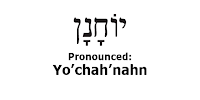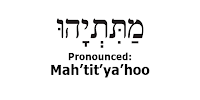Why It’s Called Hebrew
The word Hebrew, according to etymological sources, is a transliteration of the word Ivri, which is a descriptive term used for Abraham in Genesis 14:13: “And there came one [from the captives of Sodom] that had escaped, and told Abram the Hebrew...”
Some commentators suggest that Abraham is called Ivri because he was a descendant of Eber (Genesis 11:14), who, together with his own great-grandfather, Shem, was an early monotheist. (In Hebrew, Ivri and Eber share the same root letters.)
Others see the term Hebrew, or Ivri, as related to Abraham’s physical locale. Ivri technically means “one who has crossed over.” Abraham had been raised in Ur, which was the great city of the time. The Midrash suggests that Abraham interacted with Nimrod, the powerful despot of the era, and thus must have been in the center of the Mesopotamian civilization. However, Abraham left that land (at God’s behest) for the Land of Canaan, and, in so doing, he crossed the Jordan River.
More than reflecting his place of origin, however, the name Ivri signifies that he was a man who had “crossed over” in a metaphysical sense. He was the first person to transition from polytheism to monotheism and to then teach monotheism to others. Monotheism was the essence of the legacy that Abraham left to his descendants, but so was the title Ivri (Ivrim in plural). It appears again in the story of Joseph (who is referred to as an Ivri by the wife of Potifar) and, more importantly, in the story of the Exodus.
The name Ivrim, or Hebrews, was the name by which the Children of Israel were known for a long time. It’s usage is found in numerous Biblical books, such as Kings and Isaiah. However, in time, the Jewish people came to be known as Yehudim, Judeans, but the name of the language remained Hebrew (Ivrit).
Some commentators suggest that Abraham is called Ivri because he was a descendant of Eber (Genesis 11:14), who, together with his own great-grandfather, Shem, was an early monotheist. (In Hebrew, Ivri and Eber share the same root letters.)
Others see the term Hebrew, or Ivri, as related to Abraham’s physical locale. Ivri technically means “one who has crossed over.” Abraham had been raised in Ur, which was the great city of the time. The Midrash suggests that Abraham interacted with Nimrod, the powerful despot of the era, and thus must have been in the center of the Mesopotamian civilization. However, Abraham left that land (at God’s behest) for the Land of Canaan, and, in so doing, he crossed the Jordan River.
More than reflecting his place of origin, however, the name Ivri signifies that he was a man who had “crossed over” in a metaphysical sense. He was the first person to transition from polytheism to monotheism and to then teach monotheism to others. Monotheism was the essence of the legacy that Abraham left to his descendants, but so was the title Ivri (Ivrim in plural). It appears again in the story of Joseph (who is referred to as an Ivri by the wife of Potifar) and, more importantly, in the story of the Exodus.
The name Ivrim, or Hebrews, was the name by which the Children of Israel were known for a long time. It’s usage is found in numerous Biblical books, such as Kings and Isaiah. However, in time, the Jewish people came to be known as Yehudim, Judeans, but the name of the language remained Hebrew (Ivrit).


Comments
Post a Comment